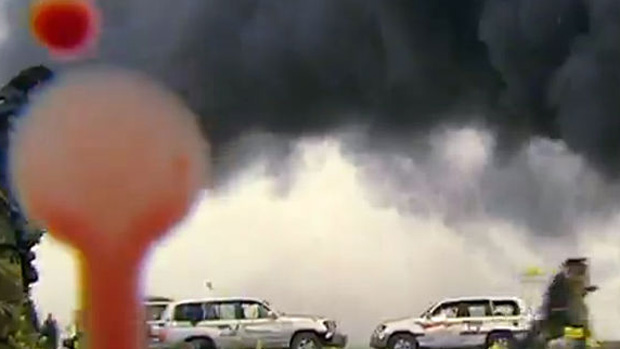Bitter Lake: Was Adam Curtis's Saudi oil doc too toxic for TV?
Critics say gripping, worrying documentary Bitter Lake may be too disturbing to be shown on TV?

A free daily email with the biggest news stories of the day – and the best features from TheWeek.com
You are now subscribed
Your newsletter sign-up was successful
Adam Curtis's new documentary Bitter Lake, just released on iPlayer, explores what went wrong for the west in Afghanistan. Drawing on a vast array of archival footage, Curtis traces events back to a meeting between US President Roosevelt and King Abdulaziz of Saudi Arabia in 1945, and goes on to examine the west's increasingly murky dealings with the middle east.
The story takes in America, Saudi Arabia, Britain and the Soviet Union, the rise of Wahhabism, Bin Laden and 9/11, and Islamic State – and suggests that the west's thirst for oil has helped fuel the rise of radical Islam today. So is it any good, and if it is, why isn't it on TV?
Sam Wollaston in The Guardian says Bitter Lake is "a story full of violence, bloodshed, and bitter ironies, mainly about how the west, through misunderstanding and oversimplification, repeatedly achieved pretty much the opposite of what it was trying to achieve". Wollaston praises the documentary for being "distinctive, genuinely different" and also "worrying, beautiful, funny, ambitious, serious, gripping and very possibly important".
The Week
Escape your echo chamber. Get the facts behind the news, plus analysis from multiple perspectives.

Sign up for The Week's Free Newsletters
From our morning news briefing to a weekly Good News Newsletter, get the best of The Week delivered directly to your inbox.
From our morning news briefing to a weekly Good News Newsletter, get the best of The Week delivered directly to your inbox.
Wollaston says it's available only on BBC's iPlayer, "because that means it doesn't have to fit in with tedious constraints like schedules (it's two hours 18 minutes long) or conventional ideas about what television should look like".
Jasper Rees in the Daily Telegraph is not so sure. "Curtis's latest über-polemic on the colliding forces of 20th-century history has been confined to the iPlayer, where his apocalyptic world view would seem to be only semi-endorsed by the BBC," says Rees. "After two and a quarter hours, you can see why."
Rees says Bitter Lake is "visually astonishing" but he criticises Curtis's "tub-thumping determinism". In the end, "the egotism and grandiloquence are maddeningly at odds with the sustained brilliance of the spectacle".
Yes, Curtis has been chastised for his avowed left-wing politics, agrees David Pollack in The List, and Bitter Lake is bound to be controversial. "There's an uncomfortable truth that the characters and situations don't chime with the history we were taught in school in many cases because they were so important that they had to stay clear of the public eye."
A free daily email with the biggest news stories of the day – and the best features from TheWeek.com
But while some will always question Curtis's impartiality, says Pollack, there's also "a certain type of audience out there for whom Adam Curtis's familiar, destabilising form of documentary narrative is like crack".
There's a reason for that, says Jon Ronson on Vice. Bitter Lake is experimental, disturbing and too long to be on TV, but it's also Curtis's best film, says Ronson. "I think with this film, he's invented a whole new way of telling a nonfiction story."
Bitter Lake is now available on BBC iPlayer.
-
 Local elections 2026: where are they and who is expected to win?
Local elections 2026: where are they and who is expected to win?The Explainer Labour is braced for heavy losses and U-turn on postponing some council elections hasn’t helped the party’s prospects
-
 6 of the world’s most accessible destinations
6 of the world’s most accessible destinationsThe Week Recommends Experience all of Berlin, Singapore and Sydney
-
 How the FCC’s ‘equal time’ rule works
How the FCC’s ‘equal time’ rule worksIn the Spotlight The law is at the heart of the Colbert-CBS conflict